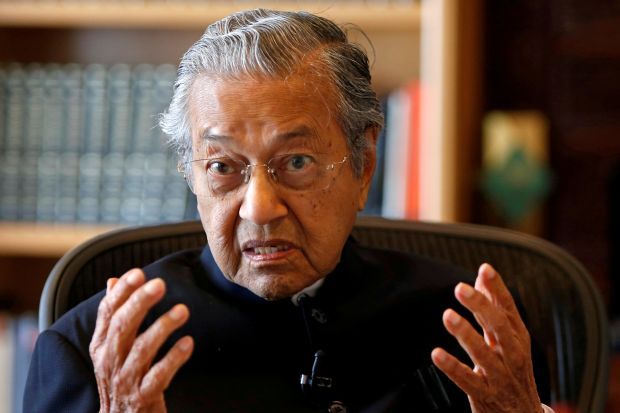PUTRAJAYA: Malaysia’s prime minister said on Monday he will seek to cancel multibillion-dollar Chinese-backed infrastructure projects that were signed by his predecessor as his government works to dig itself out of debt, and he blasted Myanmar’s treatment of Rohingya Muslims as “grossly unjust.”
Mahathir Mohamad made the comments during a wide-ranging interview with The Associated Press days before the 93-year-old leader heads to Beijing for his first visit there since returning to power in an electoral upset three months ago.
Mahathir said he wants to maintain good relations with China and welcomes its investment, so long as the projects benefit Malaysia.
But he took his toughest stance yet on Chinese-backed energy pipelines and a rail project along peninsular Malaysia’s eastern coast that were struck by his predecessor, Najib Razak. The former premier faces trial on multiple charges related to the alleged multibillion-dollar looting of the 1MDB state investment fund. He denies wrongdoing.
“We don’t think we need those two projects. We don’t think they are viable. So if we can, we would like to just drop the projects,” he said from his office in the administrative center of Putrajaya.
During his time in power, Najib drew Malaysia closer to China, which sees the multi-ethnic Southeast Asian country as a key part of its ambitious One Belt, One Road global trade initiative. The former prime minister reached deals for the 688-kilometer (430-mile) East Coast Rail Link and the two gas pipelines in 2016.
Malaysia’s new government has already suspended work on the projects, being built by Chinese state-backed companies, and called for drastic cuts in their ballooning cost, which it estimates at more than $22 billion. Some of that money has already been paid and could be difficult to recoup.
If scrapping the projects altogether isn’t doable, Malaysia will need to at least put them on hold until the future, Mahathir said.
Mahathir also urged China to respect the free movement of ships throughout the South China Sea. China and multiple Southeast Asian nations including Malaysia have competing claims on islands and reefs in the sea along with the rich fishing grounds and potential fossil fuel deposits around them.
China claims much of the sea as its own and has built up several man-made islands equipped them with runways, hangers, radar, and missile stations to bolster its claim. It has accused the US, which routinely deploys aircraft carriers, other warships, and planes to the sea, of meddling in a purely Asian dispute. Chinese ships also patrol the sea.
“We are all for ships, even warships, passing through, but not stationed here,” Mahathir said. “It is a warning to everyone. Don’t create tension unnecessarily.”
Plans 10-fold hike in water price
Meanwhile, the Malaysian prime minister is seeking to hike the price of water sold to the neighbouring country of Singapore by more than 10 times as his country searches for ways to pay off massive debts.
He said a decades-old treaty governing the water agreement needs to be revised to reflect increases in the cost of living.
The water deal has long been a point of contention between the two countries. Mahathir said in June he wants to renegotiate the deal.
Malaysia currently sells water to Singapore at 3 sen (0.7 US cents) per thousand gallons and buys treated water at 50 sen (12 cents) per thousand gallons.
Mahathir said that by comparison, the southern Malaysian state of Johor sells water to the neighbouring state of Melaka at 30 sen per 1,000 gallons a rate he described as “charitable” given that it’s a domestic deal.
“To a foreign country, we need to get more than that,” he said. He declined to discuss specifics, citing ongoing negotiations.
Singapore Foreign Minister Vivian Balakrishnan has said his country will live up to the agreement and expects Malaysia to do the same.




